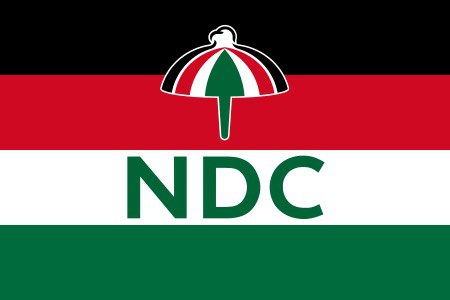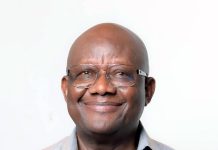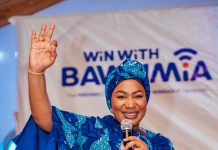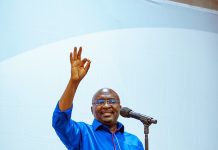Madam Doris Asomah, the Bono Regional NPP Women’s Organiser has urged Ghanaians to disregard NDC’s propaganda about the Free Senior High School policy.
According to her, the Free SHS was introduced by the NPP government, led by Nana Akufo Addo in 2016, a fact that no Ghanaian can dispute.
She explained that former President Agyekum Kufour started the free education at the basic level by introducing a capitation grant, free uniforms, free desk and President Akufo Addo continued the policy by introducing the free SHS in all Senior High Schools across the country.
Madam Asomah was speaking in an interview with a section of the media after a sensitisation programme for polling stations women organisers in the Berekum constituency organised by Berekum East NPP Women’s Wing of the NPP.
The programme was aimed at equipping polling station women organisers to visit homes and propagate the good news about free SHS to parents.
Mr Kwaku Kankam, the Berekum East NPP constituency chairman assured the party organisers that with hard work and dedication, the NPP can win the December presidential and parliamentary elections.
“I can assure you that with your dedication and hard work, we can break the 8 in the December parliamentary and presidential elections”, he said.
He stressed on the need for unity and focus on selling the good message to the Ghanaian voter to maintain the NPP.
“We need unity to execute the agenda to win and it is important for us to come together as one body and work so that we can win both presidential and parliamentary elections”, he said.
Nelson Kyeremeh, the Member of Parliament for Berekum East Constituency touted his contributions to the development of the constituency.
“Let me emphasize that for the past three and half I have contributed immensely to the development of Berekum East and there is evidence to support my claim”, he said.
According to him, he has embarked on so many developmental projects covering health and education. He, therefore, urged the people of Berekum to vote for him to enable him continue his good work.
FREE SHS POLICY
As stated in Article 25 1b of the 1992 Constitution, “Secondary education in its different forms including technical and vocational education shall be made generally available and accessible to all by every appropriate means, and in particular, by the progressive introduction of free education.”
Goal 4 of the United Nations Sustainable Development Goals (SDGs) states: “By 2030, ensure that all girls and boys complete free, equitable and quality primary and secondary education leading to relevant and effective learning outcomes.”
It has, therefore, been a priority of the government and the Ministry of Education to ensure that education is made free from basic to secondary to afford more children in Ghana the opportunity to access quality education.
In September 2017, the Ministry achieved a major milestone with the implementation of the Free Senior High School program. That year, there was a17% increase in enrolment, breaking records from previous years.
In the 2017/18 academic year, a new record was set with the highest enrolment ever seen in the country: over 470,000 students enrolled in senior high school.
The policy, one of the country’s biggest welfare programmes, has been a significant push toward achieving the Sustainable Development Goals target of free, publicly funded, inclusive, equitable, quality primary and secondary education.
Senior high school enrolment levels increased by 17.2% in 2017 and by 30.7% in 2018 as almost all students (97.1%) who qualified their basic education certificate examinations were placed into free secondary schools to continue their education.
Government spending on education increased almost five-fold between 2017 and 2021(Government of Ghana, 2021).
To accommodate the increased enrolment and address the stress on school infrastructure, the government adopted a double-track system that allows two separate cohorts of students in school at different times of the academic year.
While supporters describe the policy as bold and far-reaching, debate about its merits, implementation, impact on education quality, and financial sustainability continues.
The programme’s cost has left little fiscal space to fund educational infrastructure and materials, and heavy reliance on proceeds from Ghana’s oil sector leaves its funding subject to the uncertainties of the petroleum sector
Some experts have warned that the programme is not sustainable and should instead target only the poor, excluding students whose families can afford to pay their fees.
While the government initially rejected calls for review, financial strains exacerbated by the COVID-19 pandemic have compelled it to call for a broad stakeholder dialogue on a possible review of the policy.









